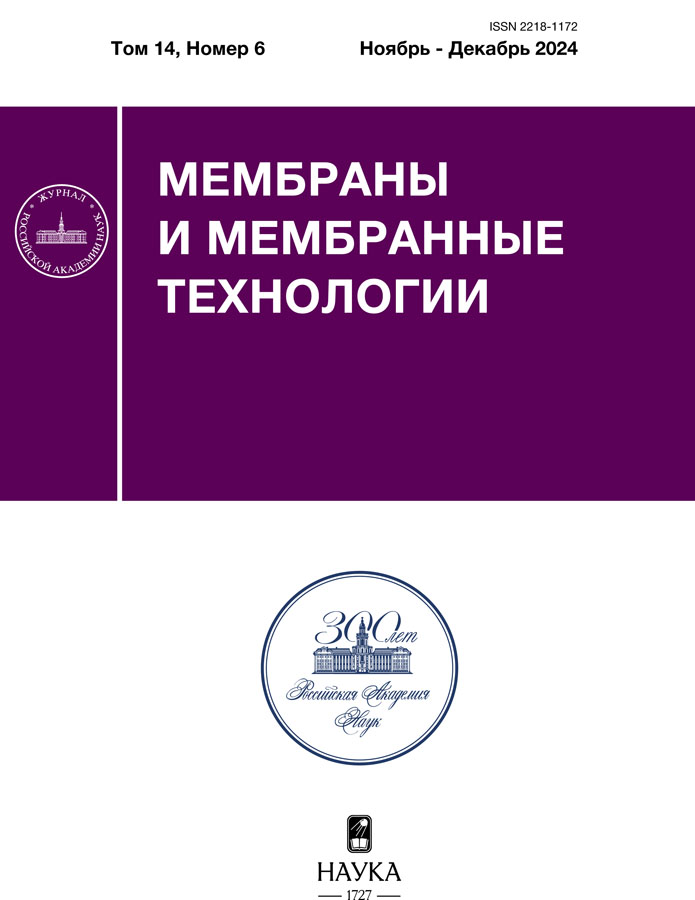Treatment of electrolyte-plasma polishing spent decontamination solution from Cr(III) radionuclides using ultrafiltration membranes
- Authors: Torapava V.V.1, Zaruba A.M.1, Kazimirsky D.A.1, Radkevich A.V.1, Nahula P.K.1, Bildyukevich A.V.2, Hliavitskaya T.A.2
-
Affiliations:
- Joint Institute for Power and Nuclear Research – Sosny, National Academy of Sciences of Belarus
- Institute of Physical Organic Chemistry, National Academy of Science of Belarus
- Issue: Vol 14, No 6 (2024)
- Pages: 517-526
- Section: Articles
- URL: https://ruspoj.com/2218-1172/article/view/684838
- DOI: https://doi.org/10.31857/S2218117224060083
- EDN: https://elibrary.ru/MAKETZ
- ID: 684838
Cite item
Abstract
This paper presents the results of using ultrafiltration for cleaning solutions, which simulate liquid radioactive wastes – spent decontamination solutions of electrolytic-plasma treatment, from chromium(III) radionuclides 51Cr(III). The transport properties of ultrafiltration membranes prepared from hydrophilized polysulfone, polyethersulfone and regenerated cellulose with different cut off was determined. The dependences of membrane permeability and 51Cr(III) rejection coefficient on the pH of solutions and thermostatting time was established. It was shown that in 8% (NH4)2SO4 solution at pH 7–8, the radionuclide 51Cr(III) formed polynuclear hydroxocomplexes, which were retained by ultrafiltration membranes and precipitated during centrifugation. The most effective membrane material was regenerated cellulose with cut off 10 kDa. This membrane retained approximately 97% of 51Cr(III) at pH 8. It was shown that increasing the time of thermostatting solutions before membrane separation leads to an increase in the retention of 51Cr(III) due to a deeper hydrolysis process with the formation of polynuclear hydroxocomplexes.
Full Text
About the authors
V. V. Torapava
Joint Institute for Power and Nuclear Research – Sosny, National Academy of Sciences of Belarus
Email: thliavitskaya@gmail.com
Belarus, 223063, Минский р-н, Минская обл., д. Прилесье, Луговослободской с/с, 47/22
A. M. Zaruba
Joint Institute for Power and Nuclear Research – Sosny, National Academy of Sciences of Belarus
Email: thliavitskaya@gmail.com
Belarus, 223063, Минский р-н, Минская обл., д. Прилесье, Луговослободской с/с, 47/22
D. A. Kazimirsky
Joint Institute for Power and Nuclear Research – Sosny, National Academy of Sciences of Belarus
Email: thliavitskaya@gmail.com
Belarus, 223063, Минский р-н, Минская обл., д. Прилесье, Луговослободской с/с, 47/22
A. V. Radkevich
Joint Institute for Power and Nuclear Research – Sosny, National Academy of Sciences of Belarus
Email: thliavitskaya@gmail.com
Belarus, 223063, Минский р-н, Минская обл., д. Прилесье, Луговослободской с/с, 47/22
P. K. Nahula
Joint Institute for Power and Nuclear Research – Sosny, National Academy of Sciences of Belarus
Email: thliavitskaya@gmail.com
Belarus, 223063, Минский р-н, Минская обл., д. Прилесье, Луговослободской с/с, 47/22
A. V. Bildyukevich
Institute of Physical Organic Chemistry, National Academy of Science of Belarus
Email: thliavitskaya@gmail.com
Belarus, 13 Surganov street, Minsk 220072
T. A. Hliavitskaya
Institute of Physical Organic Chemistry, National Academy of Science of Belarus
Author for correspondence.
Email: thliavitskaya@gmail.com
Belarus, 13 Surganov street, Minsk 220072
References
- Nagula P.R., Tretinnikov D.L., Kalenchukova O.V. // J. Int. Sci. Publications: Materials, Methods & Technologies, 2015. V. 9. P. 227–236.
- Каленчукова, О.В., Нагула П.К.,. Третинников Д.Л. // Весцi НАН Беларусi. Сер. физ.-техн. навук, 2016. № 3. С. 46–52.
- Рябчиков Б.Е. // Очистка жидких радиоактивных отходов. М.: ДеЛи принт, 2008. С. 516.
- Милютин В.В., Каптаков В.О., Некрасова Н.А. // Радиохимия, 2016. Т. 58. № 6. С. 552–555.
- Al-Rashdi B.A.M., Johnson D.J., Hilal N. // Desalination, 2013. V. 315. P. 2–17.
- Мясоедов Б.Ф. // Современные методы разделения и определения радиоактивных элементов: сб. трудов. М.: Наука, 1989. C. 312.
- Ершов Б.Г., Гелис В.М., Милютин В.В., Трусов Л., Федотов В. П., Пристинский Ю. Е. // Вопр. радиац. Безопасности, 2009. № 4. С. 28–38.
- Милютин В.В, Некрасова Н.А., Каптаков В.О. // Радиохимия, 2016. Т. 58, № 1. С. 30–33.
- Каптаков В.О., Милютин В.В., Некрасова Н.А. // Радиохимия, 2019. Т. 61, № 2. С. 152–155.
- Pérez-González A., Ibáñez R., Gómez P., Urtiaga A.M., Ortiz I., Irabien J.A. // J. Membr. Sci., 2015. V. 473. P. 16–27.
- Давыдов Ю.П., Давыдов Д.Ю. // Формы нахождения металл-ионов (радионуклидов) в растворе. Минск: Беларус. Навука, 2011. С. 301.
- Милютин В.В., Козлов П.В., Некрасова Н.А. // Современные методы переработки жидких радиоактивных отходов: учеб. пособие ОТИ НИЯУ МИФИ. 2-е изд. Озёрск, 2021. С. 172.
- Старик И.Е. // Основы радиохимии. Л.: Наука, 1969. С. 647.
- Baes C.F., Mesmer R.S. // The Hydrolysis of Cations. New York, London, Sydney, Toronto : John Wiley & Sons, 1976. Р. 490.
- Давыдов Ю.П., Вороник Н.И., Титов А.С. // Радиохимия, 2006. Т. 48. № 4. С. 327–330.
- Руководство к практическим занятиям по радиохимии, под ред. А.Н. Несмеянова. М.: Химия, 1968. С. 699.
- Schäfer A. I., Mauch R., Waite T. D., Fane A. G. // Environ. Sci. Technol, 2002. V. 36. P. 2572–2580.
- Tian K., Xu X., Zhu J., Cao S., Yin Z., Li F., Yang W. // Journal of Environmental Chemical Engineering, 2024. С. 114718.
- Gohari R.J., Lau W.J., Matsuura T., Halakoo E., Ismail A.F. // Separation and Purification Technology, 2013. V. 120. P. 59–68.
- Davydov D., Titov A., Torapava N. // Journal of Molecular Liquids, 2007. № 131–132. P. 168–172.
- Кладицкая К.Б., Заяц А.К., Кублановский В.С. // Ж. физ. Химии, 1974. Т. 48. № 12. С. 3034–3036.
- Mamah S.C., Goh P.S., Ismail A.F. // Particle Separation Techniques. Elsevier, 2022. Р. 117–154.
- Bernata X., Fortuny A., Stüber F., Bengoa C., Fabregat A., Font J. // Desalination, 2008. V. 221(1–3). P. 413–418.
- Parthasarathy N., Buffle J. // Water Research, 1985. V. 19(1). P. 25–36.
- Korus I., Bodzek M., Loska K. // Separation and Purification Technology, 1999. V. 17(2). P. 111–116.
- Petrov S., Nenov V. // Desalination, 2004. V. 162. P. 201–209.
Supplementary files

















